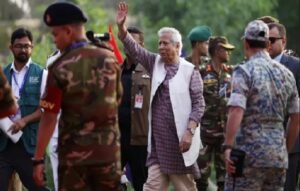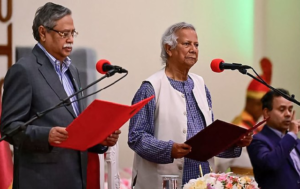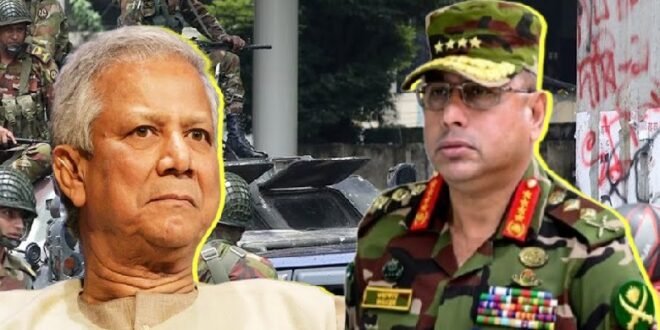25-05-2025
DHAKA: On the surface, it was a routine closed-door meeting between Bangladesh’s interim leader and Nobel laureate Muhammad Yunus and the chiefs of the country’s three armed forces, to discuss law and order but the May 20 meeting came amid what multiple officials familiar with the internal workings of the government described to media as an intensifying power struggle in Dhaka. Portrayed in social and mainstream media in Bangladesh as a “cold war” between the armed forces and the interim administration, these tensions now threaten the future of Yunus’s role, nine months after he took charge following the ousting of former Prime Minister Sheikh Hasina and the ruling Awami League.
 Hasina fled to India in August 2024 amid a mass uprising against her 15-year-long rule, during which she was accused of orchestrating extrajudicial killings and enforced disappearances.
Hasina fled to India in August 2024 amid a mass uprising against her 15-year-long rule, during which she was accused of orchestrating extrajudicial killings and enforced disappearances.
The meeting also came amid rumours that Yunus was considering stepping down. However, following another cabinet meeting on Saturday, acting head of the planning ministry, Wahiduddin Mahmud, told reporters; “the chief adviser (Yunus) is staying with us, he hasn’t said he’ll resign and the other advisers are also staying; we are here to carry out the responsibilities given to us,” following a closed-door meeting of the interim government’s advisory council amid ongoing political unrest.
Analysts, however, say, the standoff is not over yet.
We unpack the latest tumult in Bangladesh, and what it means for the country’s fledgling efforts to return to electoral democracy.
Why are tensions mounting between the military and the government?
The Bangladesh Army has remained deployed since July 2024, following the mass protests that led to Prime Minister Sheikh Hasina’s ouster. Their continued presence was necessitated by the collapse of civilian law enforcement during the upheaval, including a nationwide police strike that left many stations abandoned and public order in disarray.
 Although the police resumed operations in mid-August, the army’s presence has been maintained as part of a civil-military consensus, because of unrest in the country.
Although the police resumed operations in mid-August, the army’s presence has been maintained as part of a civil-military consensus, because of unrest in the country.
On Wednesday, Bangladesh’s army chief, General Waker-Uz-Zaman, publicly urged that national elections be held by December this year, warning that prolonged deployment of the army for civil duties could compromise the country’s defences.
According to a report by The Daily Star, General Waker told a high-level gathering at Dhaka Cantonment, “Bangladesh needs political stability. This is only possible through an elected government, not by unelected decision-makers.” The comments came during a rare address in which he delivered a 30-minute speech, followed by more than an hour of questions and answers. Officers from across the country and at Bangladeshi UN missions reportedly joined the event, both physically and virtually, in full combat uniform, a show of unity and resolve.
“The army is meant for defending the nation, not for policing … We must return to barracks after elections,” Waker was quoted in The Daily Star as saying.
His remarks indicate a difference of opinion with the Yunus administration’s stated intention of holding elections no earlier than mid-2026, to allow time for political and electoral reforms first, in order to ensure a fair election.
According to local media reports, Waker is also strongly opposed to key initiatives being considered by the interim government. On a proposed humanitarian corridor into Myanmar’s Rakhine State, he reportedly said: “There will be no corridor. The sovereignty of Bangladesh is not negotiable.” He warned that any such move could drag Bangladesh into a dangerous proxy conflict. (Int’l News Desk)
 Pressmediaofindia
Pressmediaofindia




